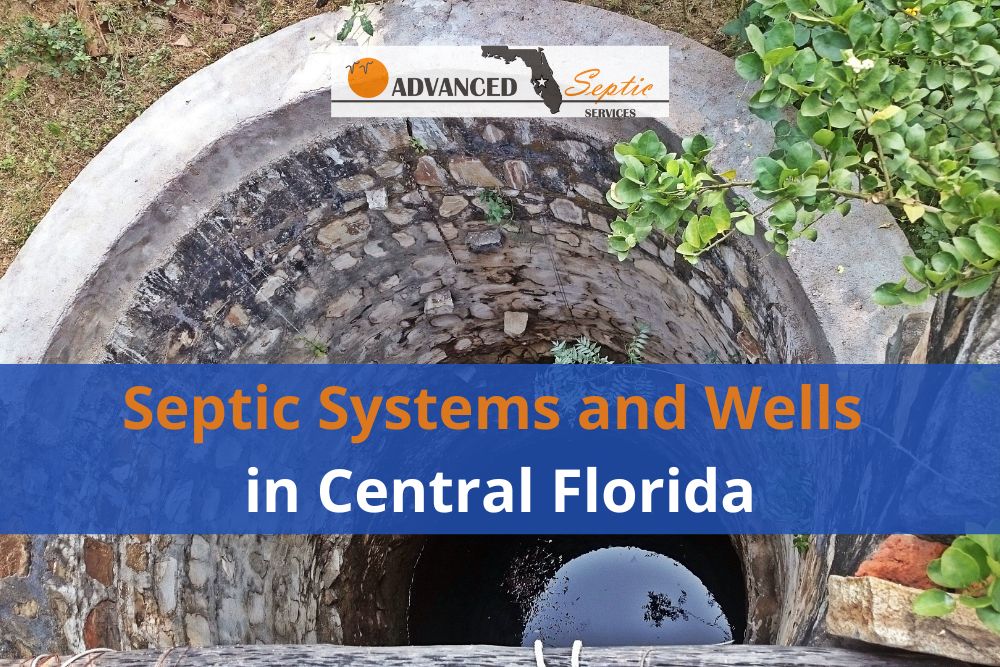Central Florida, with its unique geographical features and rural populations, has many homes utilizing septic systems and wells.
When those two systems work in tandem, there are a few extra considerations for the homeowner. Safety and protecting your water supply take priority. Hence, knowing what to expect and look out for on your property and in your home is essential.

The Importance of Septic Systems and Wells in Central Florida
In many rural and suburban areas of Central Florida, municipal sewage and water services are not available, making septic systems and wells essential. These systems independently manage waste disposal and water supply, providing a self-sustaining solution for homeowners.
Septic Systems
Septic systems treat and dispose of household wastewater through natural processes and technology. The two main components are the septic tank and the drain field (also known as the leach field). The tank separates solids from liquids, allowing bacteria to break down organic matter. The liquid effluent then flows into the drain field, undergoing further filtration before entering the groundwater.
Wells
Wells provide clean drinking water by tapping into underground aquifers. In Central Florida, the Floridan Aquifer is the primary source of groundwater, known for its abundance and quality. Properly constructed and maintained wells ensure a reliable potable water supply for household use.
Unique Challenges for Septic and Wells in Central Florida
Central Florida’s climate and soil conditions create unique challenges for septic systems and wells. The region’s sandy soils, high water table, and heavy rainfall can impact the performance and longevity of these systems.
Sandy Soils
While sandy soils offer excellent drainage, they can also lead to the rapid movement of contaminants from septic systems into the groundwater. Proper system design and maintenance are crucial to prevent pollution.
High Water Table
Central Florida’s high water table can interfere with the effective operation of septic drain fields, particularly during the rainy season. Elevated water levels can reduce the soil’s ability to filter effluent, increasing the risk of system failure and groundwater contamination.
Heavy Rainfall
Intense and frequent rainfall can overload septic systems, leading to backups and system failure. Homeowners must be vigilant during the wet season to manage water use and prevent system overloading.
Best Practices for Septic Systems in Central Florida
To ensure the longevity and effectiveness of septic systems in Central Florida, homeowners should adhere to the following best practices:
Regular Inspections and Pumping
Septic systems should be inspected by a professional every three to five years and pumped as necessary.
Water Conservation
Limiting water usage reduces the strain on septic systems. Water conservation in your home could mean spreading out laundry days, using low-flow plumbing fixtures, and staying on top of leaks.
Proper Waste Disposal
Only biodegradable materials should be flushed or drained into the septic system. Avoid disposing of grease, chemicals, and non-biodegradable items, which can clog and damage the system.
Landscaping Considerations
Plant grass or shallow-rooted plants over the drain field to prevent soil erosion and maintain system efficiency. Avoid planting trees or shrubs with deep roots near the septic system to prevent root intrusion.
Best Practices for Wells in Central Florida
Maintaining a well in Central Florida requires attention to water quality and system integrity. If you have any questions, work with your well technician and company. Standard best practices for maintaining your well include:
Regular Testing
Wells should be tested annually for contaminants such as bacteria, nitrates, and other pollutants. Testing ensures the water remains safe for consumption and helps identify potential problems early.
Proper Well Construction
Ensure that wells are constructed by licensed professionals who follow state guidelines. Proper construction prevents contamination from surface runoff and other sources.
Seal Abandoned Wells
Abandoned wells should be properly sealed to prevent contamination of the aquifer. Sealing involves filling the well with grout or other approved materials to block any pathways for pollutants.
Protect the Wellhead
Keep the area around the wellhead clean and free from contaminants. Fertilizers, pesticides, and other landscaping chemicals should not be used near the well or in large doses.
Integrating Septic and Wells Systems
Integration takes a few extra considerations, given the proximity of septic systems and wells in many Central Florida properties.
Proper Siting
Ensure adequate distance between septic systems and wells to prevent contamination. Florida regulations typically require a minimum separation distance, which should be adhered to during system installation.
Monitoring Groundwater Levels
Monitor groundwater levels regularly, especially during the rainy season. High water levels can impact septic systems and wells, so it is important to adjust water usage and maintenance schedules accordingly.
Education and Awareness
Homeowners should be educated about the interaction between septic systems and wells. Understanding how excessive water use or improper waste disposal can impact both systems helps maintain a healthy home environment.
Living with a Septic and Well in Central Florida
Septic systems and wells are vital components of many homes in Central Florida, providing essential services for wastewater management and clean water supply. Regular maintenance, proper system design, and informed management are vital in protecting water quality and maintaining a healthy living environment in Central Florida.

